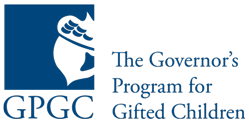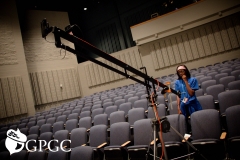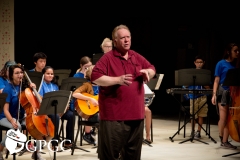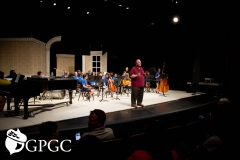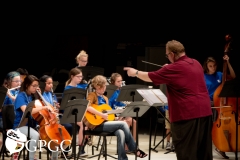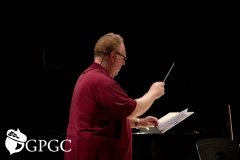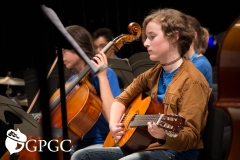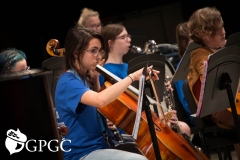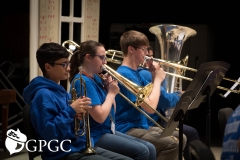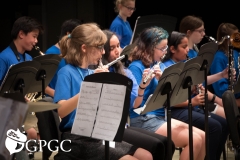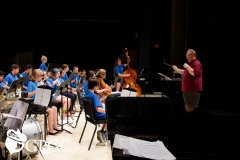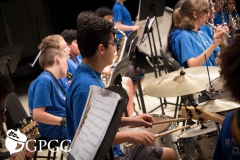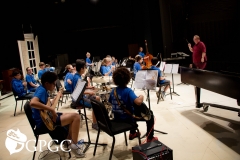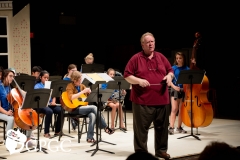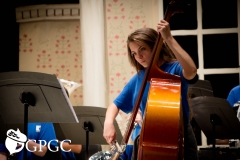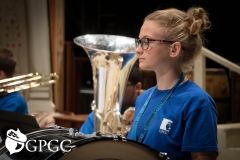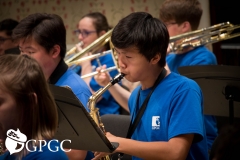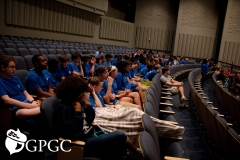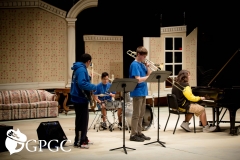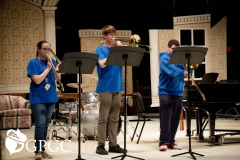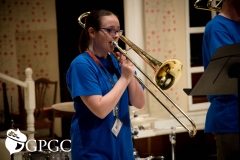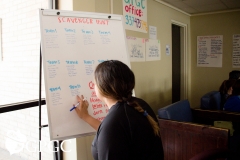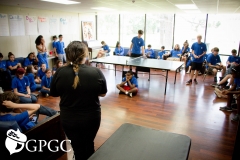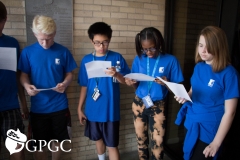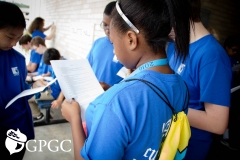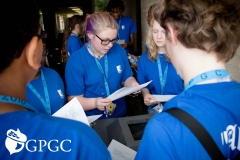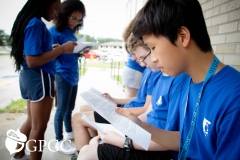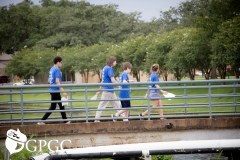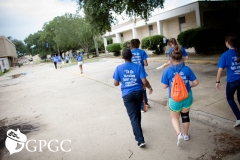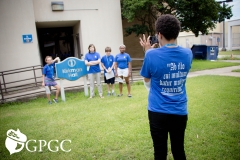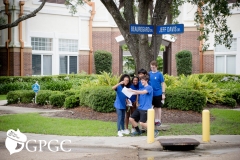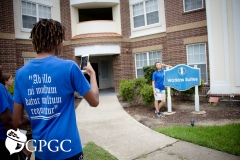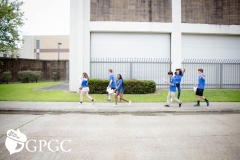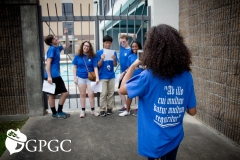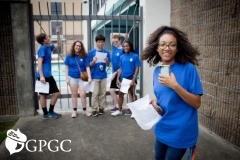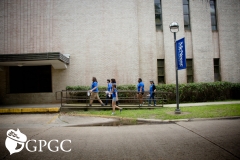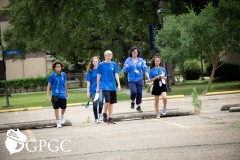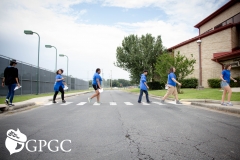Here’s the fourth issue of The Thinker! Happy Fourth of July Weekend!
Month: June 2016
The madness has transpired! And we made it through! A big shout out to all of our musicians! There is so much talent in our ranks this year and we are excited to see even more of it as the next half gets upon us. If you missed the concert, you an view it on our Facebook page. Here is our gallery of images from the event:
Here’s the third issue of The Thinker.
You may be wondering what your student is being offered each day – so here’s the link to the cafeteria’s website where you can see a daily menu.
http://www.dineoncampus.com/mcneese/show.cfm?cmd=menus2
You will need to use the drop-down menu at the top of the page to see the menu choices for where the GPGC kids eat. The cafeteria is called “Rowdy’s.”
This menu doesn’t include all of the things that the cafeteria offers on a daily basis including a salad bar, a sandwich bar, cereal bar, and a waffle making station.
Most of our afternoon classes don’t lend themselves well to weekly reports – the students are learning songs to sing in Chorus, the music and dancing in Musical, their lines and blocking in Drama, etc. We are looking to do at least one in-depth post over the summer about each one of those classes but for now, here are some reports from the few afternoon classes for which a weekly check-in makes sense.
Critical Thinking (Jessica Markstrom, Instructor)
Week One
This week the students took a personality test that allowed the instructor to see what types of traits they had (shy, leader, etc.) in order to place them into teams. We also played numerous games in the course. The games ranged from zero sum tactical games (Chess, Twixt, Score 4, Hippose and Crocodiles). I also introduced spatial games (Blokus, Tsuro), resource games (Ticket to Ride), rule based games (Fluxx), word games (Bananagrams), and odds games (Zombie Dice, Get Bit).
Week Two
This week was puzzle week in Critical Thinking. The students were challenged with various puzzle activities. One activity had each team putting together a 1,000 piece puzzle during the period. Another activity involved non-traditional 3 dimensional puzzles including placing odd shaped blocks back into cube-shaped box, a slide puzzle that was rectangular in shape in that students had to match the pattern and color on each side, and IQ Fit (a spatial puzzle game regarding patterns and resource allocation). The students had a packet of puzzles that included brain teasers, geometric puzzles, an extremely difficult sudoku puzzle, and mazes. Another day of puzzle week included logic puzzles.
Debate (Jessica Markstrom, Instructor)
Week One
Students were introduced to the Greek concept of topoi. Aristotle’s requirements of persuasive speaker was discussed. Different forms of logic were applied in a brain storming exercise. Socratic reasoning was introduced. Students were able to determine the 3 different types of debate resolutions. The week ended with the discussion of the prima facia burdens.
Week Two
The students were able to identify the prima facie burdens as well as the parts of a plan during in-class activities. Negative on-case argumentation types, such as “turns” and “take outs,” were introduced. Students wrote and presented topicality positions. A mock debate was performed to encourage public speaking abilities.
Computer Tech (Barry Humphus, Instructor)
Week One
Met the students and we introduced ourselves. Day two I discussed network topology and day three discussed network protocols. We also set up the initials computers in the lab.
Week Two
While we have had some technical problems with the equipment we have, we are managing to go forward so each student has an opportunity to learn.
Drama (Joey Boyette and Keith Chamberlain, Directors)
Week One
Students were given their roles in the drama, according to their auditions. They were introduced to warmups, theatre exercises, and some basic acting techniques. Students then did a “table read” of the script, so as to become familiar with the material. Character analysis assignments were given to the students.
Week Two
Students are getting experiences with different types of theatre games and warmups at the beginning of class. For the remainder of the period, we have been blocking the show each day, and have managed to get as far as act 2 thus far.
Musical (Keith Chamberlain, Director)
Week One
During the first part of the week, students were made familiar with the material through a viewing of the staged version, and were introduced to warmup techniques and theatre games. Toward the end of the week, they were assigned their final roles and began learning the vocals.
Week Two
We are just about finished learning the music for Act 1, and have determined that there are some cuts to be made to the material. Students have been doing very well, considering the difficulty level of the material.
Chorus (Colette Tanner, Director)
Week One
The students are now separated into voice parts and are in the process of learning the warm-up and ear training routine. We are also starting to learn a few of our performance pieces. This summer, the “theme” for the CHORAL CONCERT will be “A BRITISH INVASION.” The compositions of BRITISH composers from the Renaissance to the present will be highlighted…including the music of Tallis, Morely, Byrd, Dowland, Purcell, Handel, Holst, Vaughan-Williams, Britton, Rutter, Webber, Bowie, Queen and the Beatles. We will soon have our GPGC Choir Blog up and running (hopefully by the end of the weekend). You and the students can access information on the music and composers, recordings of their performance music and topics for discussion. Here is a link to the blog: http://gpgcsings.blogspot.com/
Large Ensemble (Rod Lauderdale, Conductor)
Week One
Large Ensemble is a group that anyone can join. Preparation for this ensemble is my biggest challenge. I never really know how many or what instruments I will have to work with until the second day of the program. Then I get to work figuring out what kind of group I will work with.
Week Two
Yes, this continues to be one of the most challenging summers for me. GPGC Large Ensemble is full of great children with a very wide range of musical experience. Though not unexpected for this age group, still a real challenge to deal with. In addition to arranging music of the whole group to play, I am arranging music for small groups of similar levels. Seems to be working so far.
Check out some photos from our 2016 Scavenger Hunt:
Our musically gifted (MG) students take one academic class in the morning with the rest of their class and then head over to the fine arts building for the rest of the morning. There they take two musically-focused classes (Music History and Music Theory) as well as have practice time. Mr. Rod Lauderdale is our MG Coordinator and the instructor for Music History and Music Theory. He has provided the following summaries:
Music History
Week One
Music History is a T/TH class. The MG’s are working out of a real College Music Appreciation text book. With that in mind, we break the book down into three sections for a three summer sequence to complete the entire text. Common to all summers is a review of terms including topics like; properties of musical sound, category of musical instruments (Western-European and scientific), musical terms like dynamics, tempos and expression marks.
Week Two
This week we finished our review of Elements of Musical sound and covered the Scientific Categories of Instruments. We continued with the Western European Categories of Instruments starting with the Strings. We made our way thru the String instruments and will finish the Winds, Brass and Percussion next week.
Music Theory
Week One
Took placement test and got started on individual theory books.
Week Two
We are all now working in individual workbooks and progressing as planned.
Here are the reports from the Composition teachers for Weeks One and Two.
Freshmen Composition (Mrs. Cecil Tate, Instructor)
Week One:
This week we discussed class format as well as senior projects. We also discussed the way that ideas can be formed into arguments for the purpose of essay writing, as well as writing about the writing process in craft essays (metacognition).
Here are some reports from the teachers of each of our Humanities classes for the first two weeks of the Program. We have organized them by class:
Freshmen Humanities (Ms. Kristen Harrell, Instructor)
Week One:
On Monday, we began classes by discussing the Latin phrase on their t-shirts and what that meant in the context of this class and the program. This led into what the Latin and Greek languages were/are and why they were important to Western Civilization. They were given a Greek alphabet sheet as well as a list of ancient Greek names and their meanings. Their homework for the next few days was to choose a name from that list to be their own for the class. This usually leads to a discussion on etymology and the understanding of English words with Greek roots. I also gave them a cheat sheet of sorts that they can use for their cursive handwriting. I have been tremendously proud of them and have told them that they have better handwriting than my high school students.
Also this week, we delved into the pre-Greek culture; the Minoans and the Mycenaeans. We discussed their beliefs their structures and inferred a great deal about their lives by looking at the ruins and artifacts from the palace complex of Knossos. They understood that with a lack of written history, understanding archeology and art history can help fill in the gaps.
The Greek ‘middle ages’ discussion was dominated by the Iliad and the Odyssey and how that sets a standard for any epic tale or journey story for the western world even into modern society. We discussed the Greek hero and what were considered the most desirable traits for a Greek. They agreed that it was different from today’s standards. I quizzed them over this material with an Open Notes Quiz and was able to gauge their progress in composition with a free response worksheet. We finished the week by watching excerpts from the miniseries, “The Odyssey”, and discussing everything from its accuracy, the set design, to the ‘Hollywood’ changes.
Week Two:
We began the week by talking about the importance and the evolution of the polis. How did this change Greek society? How did the polis rise up in importance? The students also analyzed some archaeological evidence. We also had a test over the first week’s material of which I was very pleased, though some of the students might not be. Next, we delved into the ancient Greeks viewed religion and how it differs from modern concepts of religion. These discussions led us into the polytheism of the Greeks; what we know today as Greek mythology. Of course, most of the student adored this part of the lesson.
For the second half of the week, we talked about the colonization of the Greeks in the Mediterranean and its difference from European mercantilism. The students loved our discussion over the polis of Sparta and how the Spartans fear and paranoia led to their military state. We also looked at history in Hollywood and how the subject fares in the medium of cinema. For homework they were asked to answer four critical thinking questions/prompts concerning Sparta.
Humanities Two (Mr. Cody Magee, Instructor)
Week One:
This week we set foundations for the course, discussed Utopia as an ideal and how that ideal fails when applied in real life. We read some short stories in the genre and discussed matters of justice and morality. We also discussed the historical context of the stories and how literature can serve as the window into studying any one time or period.
Week Two:
This week we worked on more dystopian literature. We finished reading the second part of Fahrenheit 451, as well as two short stories. We discussed some parallels between these “future worlds” and our own. Finally, we continued applying some of the issues regarding equality, freedom, social justice, and civics as we moved forward to begin designing our own utopia.
Humanities Three (Mr. Avee Chaudhuri, Instructor)
Week One:
Class began in earnest on Tuesday when we discussed dystopia and utopia within the context of the “GPGC Canon.” The students talked about the texts they’ve read during previous summers: Brave New World, Fahrenheit 451, and The Giver, and how these books have helped inform their understanding of real-world dictatorships and totalitarian states. As usual, the students are able to discuss grave subjects in a very mature, intelligent, incisive and often humorous manner. On Wednesday, students received their copies of 1984 and we discussed the historical backdrop against which Orwell wrote both 1984 and Animal Farm. We also talked more generally about why speculative dystopian fiction remains so popular in the West. On Thursday, we discussed the first four chapters of 1984. Popular topics from that discussion include the idea of conformity, surveillance, and whether our society, like Oceania’s, has become too desensitized to violence and human suffering (the students say “no”). On Friday, students presented on Donald Barthelme’s “I Bought a Little City.”
Week Two:
The students spent Monday finishing their individual presentations on “I Bought A Little City” by Donald Barthelme. Tuesday through Thursday were devoted to class discussion on 1984. These discussions are going well, although I’ve had to remind the class about providing textual evidence to support their comments about the novel. Recurring topics were the psychosexual development of Winston and Julia, Julia’s hedonism, competing epistemological philosophies and their relevance to a totalitarian state, and the relationship between language and thought. On Friday, we held a show trial or kangaroo court in class. I do this to demonstrate how arbitrary and absurd justice can be in a singleminded, totalitarian state. We tried Bronson Jordan for several heinous crimes, including murdering a Papa John’s delivery man, slapping a fellow student, stealing brain bucks, and using his editorial position on The Thinker to embarrass GPGC teachers. Naturally, he claims to be innocent. We will wrap up our discussion of 1984 next week and the students will sit for an essay exam on 1984 on Thursday or Friday.
Our older students (9th and 10 graders usually) are called “Grads” here at the Program. That’s a long story for another day but these students take college-level classes in the morning. This summer we are offering English (Creative Writing), Psychology in Film, and Special Topics in Criminal Justice.. Here are reports from Weeks One and Two for each of those classes.
Creative Writing (Mr. Avee Chaudhuri, Instructor):
Week One:
I spent Monday and Tuesday introducing, or re-introducing, myself to students. On Wednesday, I went over the syllabus and I explained my expectations for workshop. We talked a bit about the historiographical relevance of poetry and fiction, i.e. how creative texts form a cohesive alternative to national myths and narratives. I think this was an important discussion to have because hopefully it has disabused students of the belief that this class, because it’s largely craft-centered, will be intellectually or analytically shallow. On Thursday, we read and discussed the rules for writing put forth by several prominent authors in list form. These lists often contradict one another, and illustrate that there are no set rules for writing well. To each his or her own. The following maxim from Jonathan Franzen engendered the most debate: “It’s doubtful that anyone with an internet connection at his workplace is writing good fiction.” I was surprised to learn that many students agree with Franzen. I asked students to compile their own lists on writing well. They shared their lists on Friday and we began talking about poetry. I used William Blake’s “The Tyger” to review certain traditional elements of poetical language: rhyme, meter, lineation, etc. Next week, I’ll give the students a selection of contemporary poetry which challenges these conventions.
Week Two:
The Grad English class began the week by reading the poetry of Russell Edson, specifically “Ape” and “On The Eating of Mice.” Edson is considered the “father of the modern prose poem.” We talked at length about what distinction, if any, exists between prose poetry and micro- or flash fiction. The class readily, perhaps too readily, accepted my thesis that it is a matter of literary marketing, admittedly a jaded outlook but I think a fair one. We then discussed the lyrical and narrative impulses in poetry by reading Pablo Neruda and Kevin Young. I tried to disabuse the students of the belief that the lyrical and narrative impulses are mutually exclusive, although it remains to be seen how successful I was. On Wednesday we began discussing intertextuality and ekphrasis in poetry. On Thursday we discussed the political connotations of poetry, the visual elements of poetry, and I also lectured briefly on the Cento. We concluded the week by discussing how the poetry workshop will run next week, and doing a practice workshop.
Special Topics in Criminal Justice (Mrs. Jessica Markstorm, Instructor):
Week One:
This week was defined by the question “what is criminal justice?” Types of crimes ranging from mala prohibita, mala in se, felonies, misdemeanors, cybercrime, occupational crime, and visible crime were introduced to students. The elements of a crime, including mens rea, were discussed and a Supreme Court case was used to demonstrate statutory crimes, which do not require mens rea. Students debated the merits of the due process criminal model versus the crime control model. The week ended with an evaluation of victimology that included a discussion on who is most likely to be a victim of crime.
Week Two:
This week we discussed basic due process rights. We briefly covered the civil liberties established in the 4th, 5th, 6th, 8th, and 14th amendments. Supreme Court cases such as Gideon v. Wainright were used to illustrate incorporation of civil liberties to state governments. Students were introduced to defenses and excuses for committing crimes. Special attention was placed on Louisiana’s insanity excuse requirements. We also discussed basic aspects of policing, requirements of joining the police force, styles of policing, and the different sources of stress for police officers.
Psychology (Dr. Linda Brannon, Instructor):
Week One:
This session’s topic in psychology is Psychology in the Movies, and my goal is to present topics in perception, learning, memory, sleep and dreams, hypnosis, and altered states of consciousness from drugs. I hope to funnel these topics into the question: Is mind control possible? To accomplish the goal of exposing students to these topics in psychology and exploring the possibility of mind control, we will see movies that touch on these topics.
We began with a discussion of the definition of psychology and progressed to the history of psychology and how psychologists consider psychology to be a science. Many people have trouble accepting psychology as a science, partly because they focus on psychologists as therapists and partly because they view psychology as a subject that cannot fit within the rules of science.
To examine the discrepancy between the scientific view and mystical views, I showed the students scenes from the movie The Exorcism of Emily Rose, which presents a clash of views revolving around the death of a young woman, Emily Rose. One view is that Emily suffered from a medical condition; the other view is that Emily was possessed by demons. I wanted students to evaluate the evidence (as depicted in the movie). We will continue with some analysis and discussion next week and then proceed to topics of perception and learning.
Week Two:
This week was devoted to the topic of learning. We began with classical conditioning—Pavlov and the slobbering dogs—and analyzed that process. Then, we discussed the factors of consistency and timing, which affect this process of associative learning. Classical conditioning applies to a number of everyday responses, so we talked about examples from our own lives.
We moved on to the topic of operant conditioning, with the concepts of reinforcement and punishment. Students have some experience of positive reinforcement through the token economy, but we discussed examples and applications of this type of learning.
Students had a written assignment that covered psychology as a science and classical and operant conditioning.
Students saw the movie The Matrix to introduce the topic of perception, and we began a discussion of how tied we all are to our sensory and perceptual limitations.
